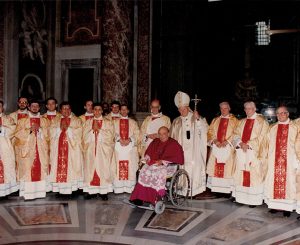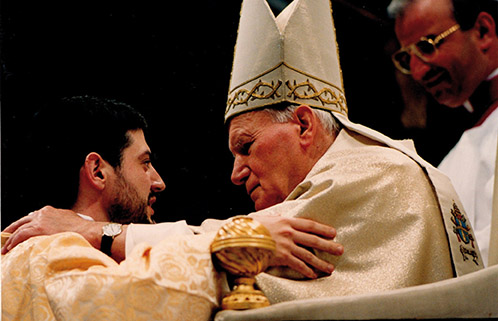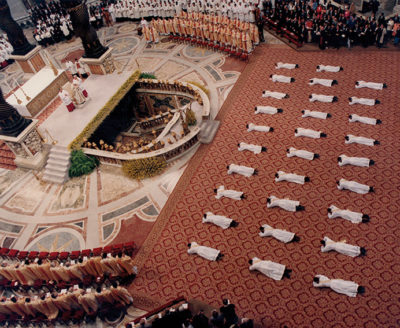Presbyteral Ordenation of 29 deacons 5-02-1993
St. John Paul II

Saint Peter, May 2, 1993
Sunday, May 2, XXX World Day of Prayer for Vocations, John Paul II has conferred presbyteral ordination on twenty-nine deacons from the diocese of Rome (of whom 16 have been formed at the Redemptoris Mater seminary in Rome). The solemn rite has been carried out in the Basilica of Saint Peter with the presence of a great assembly of relatives and friends of the new priests. The Rector of the “Redemptoris Mater”, Bishop Mons. Giulio Salimei, has followed the celebration in a wheelchair, along with other Prelates, among whom was Mons. Josef Cordes, Vice President of the Pontifical Council for the Laity and in charge of follow the apostolate of the Neocatechumenal Communities. Also present were Kiko Argüello, initiator of the Neocatechumenal Way and promoter of the “Redemptoris Mater” Presbyteral Formation Centers that are configured as international diocesan missionary seminaries (there are currently about 20 in America, Europe, Asia and Oceania and others are getting in progress) and Carmen Hernández, his spiritual adventure companion. Before conferring on the candidates the sacrament of Holy Order, the Pope addressed the following homily:
“1. I am the door of the sheep ”(Jn 10,7). The Easter liturgy of the Good Shepherd is expressed in two images, which complement each other. The one of the Pastor, especially. Christ says of himself: “I am the good shepherd” (Jn 10,11). Both the responsorial psalm and the fragment of the first letter of Saint Peter develop this liturgical image: the Good Shepherd guides his flock to the pastures of fresh grass, he assures that the sheep have food and drink at the right time, protects them in dangerous places, defends them against the enemy. Especially the Good Shepherd is willing even to offer his life for the sheep. Precisely on this thought the first letter of Saint Peter stops. In it we speak of the sufferings of Christ, who “carried our sins in his body on the wood of the cross, so that dead to our sins, we might live for justice; with your wounds you have been healed ”(1 P 2,24-25).

2. And it is right here where it enters the whole of the thought of the liturgy the second image: that of Christ “Door of the sheep”. The Good Shepherd not only guides his flock,inviting him to follow in his footsteps (cf. Jn 10,4), he will also enter through the door. There is, therefore, a place that serves as a refuge for the flock. It is a place of shelter, where sheep live and rest after the fatigue of the road. The good Pastor not only introduces them to this refuge. He himself is the door. Christ says: “I am the door of the sheep … if one enters through me, he will be safe ”(Jn 10,7.9). “Safe”, that is, he will have life and he will have it in abundance (cf. Jn 10,10).Christ, Good Shepherd, has become the door of salvation for humanity, because “it has carried our sins … on the tree of the cross ”(1 P 2,24).
. Those who listened to the apostle Peter on the day of Pentecost asked above all about the Door through which they had to pass to reach salvation. The question was: “What are we to do, brothers?” (Acts 2.37). And Peter’s answer: “Convert and let each one of you be baptized in the name of Jesus Christ, for the remission of your sins” (Acts 2.38). Therefore, it is clear: to enter through the door that is Christ means: to convert. Converting, in turn, means: receiving Baptism. Baptism is the door of the Church. Through this door man is introduced to the salvation obtained by the blood of Christ. Christ has instituted Baptism. He himself – crucified and risen – is the door to the salvation of men through Baptism. In Baptism we receive the gift of the Holy Spirit. When men, who without their guilt ignore this way of salvation and this Door, also receive the Holy Spirit, then Christ also becomes a Door for them. Under heaven there is no one else for whom we can save ourselves (cf. Acts 4:12). Christ is the only mediator between God and men.

4. Today, in the Basilica of Saint Peter, the deacons of the Church that is in Rome receive presbyteral ordination. In this Rome, in which, at the beginning of a long series of pastors and bishops, is Peter, an apostle of Christ, his witness until his blood is shed. He was the first to convert the “lost sheep” of the ancient world to Christ “Shepherd and Guardian of our souls” (cf. 1 P 2,25).You will be ordained, dear children, in the year in which the diocesan Synod of Rome concludes: Synod of whose teaching and spirit of communion and mission you are called to be faithful interpreters and servants. In this eloquent synodal context, the gift of the Holy Spirit, who configures you to Christ the Good Shepherd, gives you the strength to be, in the midst of your brothers, credible announcers and witnesses of the Gospel, the word of truth and life: this city awaits you From Rome, which wants to receive Christ through your ministry, the vast world that is mysteriously linked to this city awaits you. The Pontifical Roman seminary, the “Redemptoris Mater” seminary and the Presbyteral Formation Center of the Shrine of the Virgin of Divine Love, where you have received your formation, today rejoice with you and with you give thanks to God, gathered in this Basilica together to those who, by ties of blood, friendship and ecclesial belonging, have traveled near you on the path that has led you to the priesthood. The grace of this day also redounds on your Seminaries, on your families, on your friends and on the whole Church of God that is in Rome.
5. Dear new priests! The laying of the hands and the prayer of Him who, in Rome, is Peter’s unworthy successor, transmit to you the grace and sacramental character of the ministerial priesthood. Every bishop fulfills his ministry as “vicar of Christ.” The bishop of Rome, in history, was also called “vicar of Peter”. As you receive ordination, meditate deeply on the mystery of the shepherd, who is the door of the sheep, so that you may be increasingly worthy of the treasure that has been entrusted to you. He who has begun this good work in you, may also bring it to completion. Amen!”.